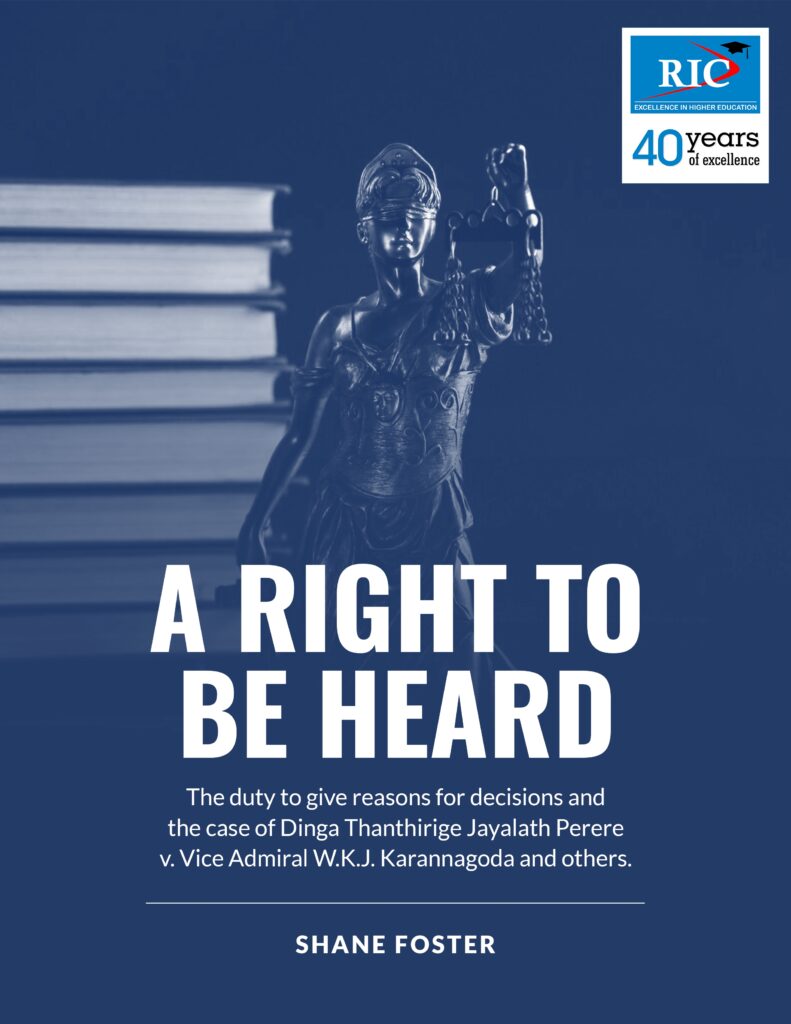
The duty to give reasons for decisions and the case of Dinga Thanthirige Jayalath Perere v. Vice Admiral W.K.J. Karannagoda and others.
Shane Foster[1]
The recent Judgment of the Honourable Supreme Court in the case of Dinga Thanthirige Jayalath Perere v. Vice Admiral W.K.J. Karannagoda and others[2] is a sight to behold. Spanning almost 138 pages, it consists of two separate Judgments: a majority judgment and a dissenting minority Judgment. The most pertinent portions of those Judgments are those portions dealing with an administrative body’s duty to give reasons for its decisions. What is a duty to give reasons? And why is it so important? According to Endicott[3] “The giving of reasons is a procedural step that informs people affected by a decision (and, potentially, the public) of the substance of a decision. It seems to be a very attractive general notion that public authorities ought to explain their decisions. It is an advance in accountability in itself. It is a step in open government…”[4]
I first advert to the Judgment of the majority in the matter. In their Lordships’ Judgment, the Honourable Judges of the Supreme Court advert to the current position of a duty to give reasons. Their Lordships hold that although there is a general duty to give reasons the “… Jurisprudence of our courts that considered developments in English common law as set out above had therefore recognised, that the “duty to give reasons” by administrative authorities when taking decisions on various matters need to be examined in the context of the given situation. The statutory scheme within which such authorities are empowered to take decisions and the specific circumstances of each case needs to be examined…”.
Their Lordships hold that when assessing whether a particular public authority has a duty to give reasons for its decisions, a Court must first look into whether there is a statutory duty to that effect. If there is no such statutory duty, then the next step would be to identify whether “the manner in which authorities had exercised their statutory duties had adversely impacted on the legality and reasonableness of the decision…” and in that context to consider whether the common law imposes a duty to give reasons. It is submitted that the test propounded by the majority (specially the portion in italics) and the process of applying it is complicated, unwieldy, prone to misuse, does not further the aim of open government and (in most instances) would leave a duty to give reasons to the very last moment (to wit in the writ court itself) even though it is derived from the law as it is understood and applied today.
I would then advert to the minority Judgment of Yasantha Kodagoda, P.C., J. in the same case. His Lordship propounds an easier to use, all encompassing, general duty to give reasons in the following vein: “Unless specifically precluded or exempted by statutory provision, or the duty to give reasons has been impliedly yet unambiguously negatived, a statutorily created body empowered by law to take a decision which may have a bearing on the rights of a person, is required by law, to, following the applicable procedure provided by law, declare and forthwith record reasons for its decision. Provided however, a statutory body may be excused from the fulfilment of such legal duty, if the duty to disclose reasons for the decision has been dispensed with by the party affected by such decision, or there existed a legally justifiable reason for having in the circumstances of the situation, refrained from giving reasons for the decision. In such event, the grounds for not revealing reasons for the decision shall be declared and recorded along with the decision.”
Justice Kodagoda’s Judgment is clearly obiter in that it is the minority Judgment. It is submitted however, that this obiter dicta statement has much to recommend it. We ought to look no further than the minority Judgment itself for the advantages of having an all-encompassing duty to give reasons for the learned Judge lists the various advantages of having such a general duty to give reasons[5]. Chief amongst them, for the purpose of judicial review, is the reason that once reasons are given ab initio for a decision of a public authority, such decisions are more readily reviewable in a writ court.
As has been attempted to be elucidated here within the short space allotted for this article, Justice Kodagoda’s Judgment evinces a more lucid position in relation to this area of the law. The Judgment, it is submitted, must also be commended since it is a step further in open government, a thing that would bode well for Sri Lanka should it one day become law. There are many examples of obiter dicta statements becoming more important than the ratios of the cases in which they were promulgated. This obiter dicta statement appears to be one of them.
[1] Attorney-at-Law, LLM(Colombo, reading), LLB (Hons.)(Lond.), GradDipProfAccy(NZ), Cert. HRM(SL)
[2] SC Appeal 11/2017, decided on 11.01.2023.
[3] Administrative Law, Fourth Edition, Oxford University Press at page No. 200.
[4] Yasantha Kodagoda, P.C., J. in SC Appeal 11/2017 defines a duty to give reasons as follows: “‘Reasons for a decision’ are the internal cognitive thought processes which result in the decisionmaker arriving at his decision. Reasons would reflect the internal step-by-step process which culminates in the final decision. It amounts to the ‘logic’ which links the ‘material considered’ with the ‘decision’ arrived at.”
[5] At page No. 76 of the Judgment.

